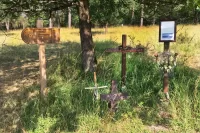
Three Bates College students, an alumna receive Fulbright grants
Three Bates College seniors and one alumna received 2008-09 grants for postgraduate research from the Fulbright U.S. Student Program.
Dana Burgard of Kinnelon, N.J.; Allison Caine, a member of the Bates class of 2007 from Bar Harbor; Caitlin deWilde of East Hampton, Conn.; and Brandt Miller of Westfield, N.J., plan to pursue comprehensive studies in Europe, South America and Asia.
The Fulbright Program, established in 1946, is sponsored by the U.S. State Department. Fulbright recipients come from all 50 states, the District of Columbia and Puerto Rico and from more than 250 U.S. institutions, representing a diverse cross-section of American higher education. About 1,200 U.S. Student Program grants are awarded each year.
“Four Fulbright awards, we believe, is the highest number in the history of Bates,” says Elizabeth Eames, associate professor of anthropology and chair of the college’s Graduate Fellowships Committee. The committee helps Bates students learn about and apply for prestigious grants such as the Fulbrights and the Watson Fellowship, one of which also went to a Bates senior this year.
Burgard received a Fulbright English Teaching Assistantship for work in Germany. She will teach in a “gymnasium,” a type of school for students aged 12 to 18. In addition to teaching English, she wants to take courses on modern German literature with an emphasis on themes of justice.
She spent her junior year in Munich, and immediately felt a deep sense of connection with the country. “While I was there, I fell in love with German culture and began to seriously consider teaching as a future career option,” she says.
Burgard feels the Fulbright is “the perfect way to spend more time in Germany and to gain what I believe will be invaluable experience both in and out of the classroom.”
Caine plans to conduct research in Cuzco, Peru. She wants to study the 20th-century Peruvian cultural movement that Peruvian anthropologist Jorge Flores Ochoa termed “Incanismo,” a widespread fascination and identification with Incan culture. It has pervaded modern Peruvian nationalist discourse and is an essential component of the tourism industry, particularly in Cuzco.
Caine, who spent time in Peru in 2006 to do research for her Bates senior thesis, was intrigued by Cuzco’s “Inti Raymi,” or festival of the sun. She found it to be a “powerful expression of Peruvian cultural identity” and decided after graduation to return to Peru to explore the roots of Incanismo.
Caine will perform her research through the Instituto Latinamericano de Investigacion. In addition to her research, she plans to take courses on tourism at a local public university and to work with organizations that promote responsible tourism.
DeWilde received a Fulbright English Teaching Assistantship. Influenced by a junior year in Nantes, France, deWilde will teach English to university students at the Université Libre de Bruxelles in Brussels, Belgium. She will also study Belgian attitudes toward East Asian immigrants and hopes to compare the challenges those immigrants and native Belgians face when learning English.
“Belgium is a fascinating country from linguistic and pedagogical perspectives,” she says. “Language has always been a source of political tension and national division because Belgium has three spoken national languages.”
DeWilde plans to research how these cultural tensions influence Belgian attitudes towards the East Asian immigrant population, particularly in the classroom, which she sees as a microcosm of Belgian society.
“At Bates, I have discovered that I learn about myself by learning other languages and exploring other cultures,” she says. “While in Belgium, I hope to promote a similar attitude that encourages students to break down undefined cultural frontiers.”
Miller received a research fellowship for work in Mongolia. Through cultural immersion and a survey of oral and written narratives, he hopes to investigate changing Mongolian masculinities. He hopes his subject groups — nomadic herders, urban dwellers and Buddhist monks — will provide insight into how forces such as tourism, entertainment and business are changing men’s lives and modifying traditional ideals.
He plans to live in the Altai Mountains of western Mongolia with the nomadic Kazakhs, the largest minority in Mongolia, during their falconry season. He will then stay in the Gobi desert at the oldest Buddhist monastery in Mongolia. Lastly, he will conduct research amongst urbanized inhabitants in the capital city of Ulaanbaatar.
Miller spent a semester of his junior year in Mongolia, and immediately “fell in love” with the country. “It is a land filled with such contrasts,” he says. “You have ancient traditions mixed with socialist remnants from the years as a Soviet satellite, and combining with new influences from the U.S. and China. Living in yurts, nomadic herders of camel, reindeer and yaks contrast with entrepreneurs of the capital city exposed to discos and the Internet.”
Miller hopes to use his education as an English major with a creative writing concentration and a minor in anthropology to write a creative nonfiction piece about his experiences in Mongolia during this transition.
“The intimate environment of Bates, the access to the wonderful minds of professors and the intellectually curious student body have fueled my desire to push myself into intellectual and emotional arenas that I never thought possible,” Miller says.
“A fellowship such as the Fulbright is the ideal opportunity to utilize my academic and personal interests during the first step in my post-college journey.”




